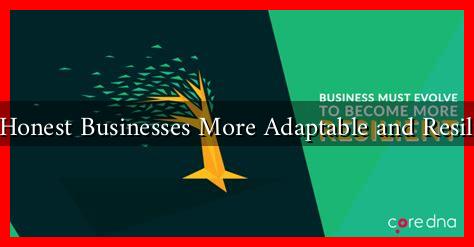-
Table of Contents
- Are Honest Businesses More Adaptable and Resilient?
- The Foundation of Honesty in Business
- The Link Between Honesty and Adaptability
- Case Studies: Honesty in Action
- 1. Patagonia
- 2. Johnson & Johnson
- Statistics Supporting the Case for Honesty
- Challenges Faced by Honest Businesses
- Conclusion: The Resilience of Honesty
Are Honest Businesses More Adaptable and Resilient?
In today’s fast-paced and ever-changing business landscape, adaptability and resilience are crucial traits for any organization aiming for long-term success. But what role does honesty play in fostering these qualities? This article explores the relationship between honest business practices and their ability to adapt and thrive in challenging environments.
The Foundation of Honesty in Business
Honesty in business refers to transparency, integrity, and ethical behavior in all dealings with stakeholders, including customers, employees, suppliers, and the community. An honest business culture promotes trust, which is essential for building strong relationships. Here are some key aspects of honesty in business:
- Transparency: Open communication about business practices, challenges, and successes.
- Integrity: Adhering to moral and ethical principles, even when faced with difficult decisions.
- Accountability: Taking responsibility for actions and their consequences.
The Link Between Honesty and Adaptability
Adaptability is the ability of a business to adjust to new conditions and challenges. Honest businesses are often more adaptable for several reasons:
- Trust from Stakeholders: When a business is honest, it builds trust with customers and employees. This trust fosters loyalty, making it easier for the business to pivot when necessary.
- Open Feedback Loops: Honest businesses encourage feedback from employees and customers, allowing them to identify areas for improvement and adapt quickly.
- Reputation Management: A reputation for honesty can help businesses weather crises more effectively, as stakeholders are more likely to support them during tough times.
Case Studies: Honesty in Action
Several companies exemplify how honesty contributes to adaptability and resilience:
1. Patagonia
Patagonia, the outdoor clothing brand, is renowned for its commitment to environmental sustainability and ethical practices. The company openly shares its supply chain information and actively engages in environmental activism. This honesty has not only built a loyal customer base but has also allowed Patagonia to adapt its business model in response to changing consumer preferences towards sustainability.
2. Johnson & Johnson
In 1982, Johnson & Johnson faced a major crisis when several bottles of Tylenol were tampered with, leading to fatalities. The company responded with transparency, recalling millions of bottles and communicating openly with the public. This honest approach not only salvaged their reputation but also strengthened their brand loyalty, allowing them to recover and adapt their safety protocols effectively.
Statistics Supporting the Case for Honesty
Research supports the notion that honesty contributes to business resilience:
- A study by the Harvard Business School found that companies with high levels of trust among employees are 2.5 times more likely to be adaptable.
- According to a survey by Edelman, 86% of consumers say that they will choose to buy from a company they trust, even if it costs more.
Challenges Faced by Honest Businesses
While honesty has many benefits, it can also present challenges:
- Short-term Losses: Being honest about failures or challenges may lead to short-term financial losses.
- Increased Scrutiny: Honest businesses may face more scrutiny from stakeholders, which can be stressful.
- Balancing Transparency and Confidentiality: Finding the right balance between being transparent and protecting sensitive information can be tricky.
Conclusion: The Resilience of Honesty
In conclusion, honest businesses tend to be more adaptable and resilient due to the trust they build with stakeholders, their open feedback mechanisms, and their ability to manage their reputations effectively. While challenges exist, the long-term benefits of fostering an honest business culture far outweigh the risks. As the business landscape continues to evolve, companies that prioritize honesty will likely find themselves better equipped to navigate change and thrive in the face of adversity.


